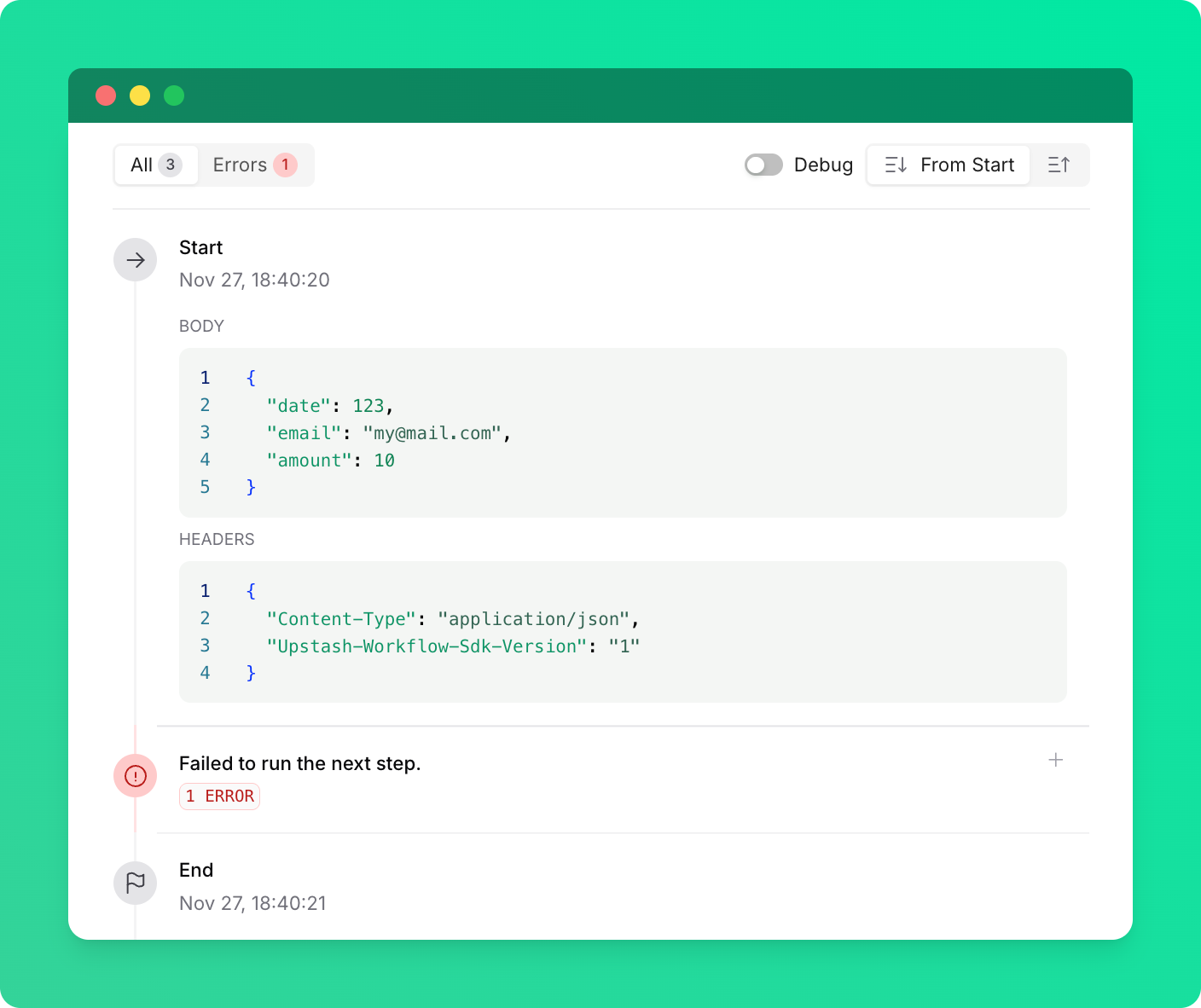Running Steps Inside try/catch Blocks
When running steps (run, sleep, call, or any other step) inside a try/catch block, you’ll encounter the following error:WorkflowAbort error is thrown by the Workflow SDK when a step executes successfully. When you run a step inside a try/catch block, you have two primary options:
-
Re-throw WorkflowAbort: If you need a try/catch block, re-throw the
WorkflowAborterror: -
Avoid Running Steps in try/catch: The simplest solution is to not wrap steps in try/catch blocks. If you have a
context.runinside try/catch, you can try putting the try/catch inside the context.run.
context.requestPayload Becoming Undefined
Headers Considerations
In some frameworks, you may need to pass specific headers for the workflow to accessrequestPayload:
- Try passing
Content-type: text/plainorContent-type: application/jsonheaders when starting the workflow. - Note that
publishJSONcan only publishContent-type: application/json.
context.call Execution
During a workflow run, the endpoint will be called multiple times. While executing context.call, the endpoint is called at least twice, with the SDK attempting to run the route function until the first step for custom authorization.
Accessing context.requestPayload before any step can result in it becoming undefined:
context.call, and resolving this specific interaction is on our roadmap. Note that if you are passing context.requestPayload as a parameter to context.call, the payload remains intact. However, during the actual execution of context.call, the context.requestPayload becomes undefined due to the SDK’s internal workflow processing steps.
To fix this issue, you can try adding a step which returns the payload:
Verification Failed Scenarios
When QStash signature verification is enabled, you might encounter an error like:- Ensure you start the workflow using
client.triggeror by publishing to QStash. - Verify that
QSTASH_CURRENT_SIGNING_KEYandQSTASH_NEXT_SIGNING_KEYenvironment variables are correct. - Pass appropriate
Content-typeheaders when starting the workflow.
Authorization Error Handling
Consider this workflow:- HTTP status: 400
- Error message:
Failed to authenticate Workflow request.
someCondition() is non-deterministic, the recommended approach is to transform this condition into an explicit workflow step. Here’s the recommended pattern for handling such non-deterministic conditions:
Retry Configuration
Retry settings can be configured in three locations:-
Workflow Start (publish/publishJSON or client.trigger)
- Default retries: 3
-
Context Call
- Default retries: 0
-
Serve Options
- Default retries: 3
- Covers all other requests except the above two
Verbose Mode Diagnostics
This feature is not yet available in
workflow-py. See our
Roadmap for feature parity plans and
Changelog for updates.
Localhost in URL Warning
Deduplication Log
Since QStash has at least once delivery guarantee, there is a very small chance that a step will run twice. This is why we suggest idempotancy. When this happens, the duplicate step should print the following log and terminate:Network Issue Warnings
In rare instances, the workflow endpoint may complete its task successfully but fail to send a proper response. The SDK is designed to detect such occurrences. When this happens, the workflow endpoint will return a200 status code and log one of the following three warnings:
HTTPS Protocol Issue
The Workflow SDK automatically infers the protocol (HTTP or HTTPS) based on the incoming request object in your application. However, if your app is deployed behind a proxy (e.g., Railway or similar platforms), the proxy may terminate SSL and forward the request to your app using plain HTTP. This can cause the SDK to mistakenly infer that the request is using HTTP instead of HTTPS. To fix this, explicitly set theUPSTASH_WORKFLOW_URL environment variable to the base URL of your application.
This disables automatic protocol inference and uses the provided static URL instead.
If you’re using Express.js behind a front-facing proxy, an alternative solution is to enable proxy trust so Express correctly identifies the original protocol from the X-Forwarded-Proto header:
Workflow Stuck in First Step
Imagine that you trigger your workflow with client.trigger and the workflow starts (you see the run in the dashboard), but it doesn’t proceed beyond the first step. If it appears like the initial step has failed:- Expand the step in the dashboard to see detailed logs to check for any error messages or stack traces that can provide insights into what went wrong.
- Ensure that the workflow endpoint is accessible. You can test by sending a
curlrequest to see if the request lands on the endpoint. - Ensure that the URL you passed to the
client.triggermethod matches the workflow endpoint URL. - Verify that you’re using the latest SDK version both in the workflow endpoint definition and in the code that calls
client.trigger.
- Workflow SDK could be unable to correctly infer the workflow URL due to a proxy or an issue in the request object. To check if this is the issue, try passing the
baseUrlparameter to theservemethod. This will override the automatic URL inference and use the provided base URL instead.
Non-workflow Destination Error
Full error:client.trigger or via Request Builder on Upstash Console. If you check Upstash Console, you will see that the workflow run has started but failed before running any steps:

- You are calling a valid workflow endpoint.
- Both the caller and the workflow endpoint are using the latest SDK versions.

